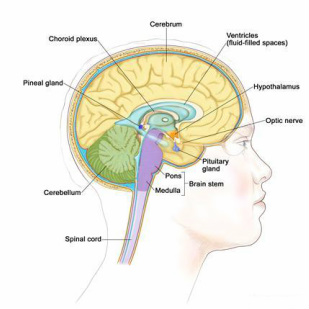OVERVIEW

The pituitary gland is a small endocrine organ at the base of the brain just above the back of the nose, that controls a multitude of important functions in the body. It is divided into an anterior lobe, and posterior lobe, both of which are involved in hormone production.
The anterior pituitary synthesizes and secretes the following important endocrine hormones:
PITUITARY TUMOUR
A pituitary tumour is an abnormal growth of cells on the pituitary gland.They are generally benign and represent from 10% to 20 % of all primary brain tumours.
Pituitary tumors are divided into three groups:
The anterior pituitary synthesizes and secretes the following important endocrine hormones:
- Adrenocorticotropic hormone (ACTH): released under conditions of stress. Increases corticosteroids.
- Thyroid-stimulating hormone (TSH): regulates thyroid gland.
- Growth hormone ('HGH'): stimulates cell division and growth.
- Prolactin (PRL): stimulates milk production in breasts.
- Luteinizing hormone (LH): in females, it triggers ovulation. In males it stimulates testosterone (acts with next).
- Follicle-stimulating hormone (FSH): regulates development, growth, puberty, reproduction.
- Melanocyte-stimulating hormone (MSH): stimulates the production and release of melanin by melanocytes in skin and hair.
- Oxytocin, most of which is released from the hypothalamus: has effects on nerve transmission, and on females during and after birth.
- Antidiuretic hormone (ADH, also known as vasopressin): controls the reabsorption of molecules in the tubules of the kidneys. Increases arterial blood pressure. It plays a key role in homeostasis, and the regulation of water, glucose, and salts in the blood.
PITUITARY TUMOUR
A pituitary tumour is an abnormal growth of cells on the pituitary gland.They are generally benign and represent from 10% to 20 % of all primary brain tumours.
Pituitary tumors are divided into three groups:
- Benign pituitary adenomas: Tumors that are not cancer. These tumors grow very slowly and do not spread from the pituitary gland to other parts of the body.
- Invasive pituitary adenomas: Benign tumors that may spread to bones of the skull or the sinus cavity below the pituitary gland.
- Pituitary carcinomas: Tumors that are malignant (cancer). These pituitary tumors spread into other areas of the central nervous system (brain and spinal cord) or outside of the central nervous system. Very few pituitary tumors are malignant.
- Non-functioning pituitary tumors do not make hormones.
- Functioning pituitary tumors make more than the normal amount of one or more hormones. Most pituitary tumors are functioning tumors. The extra hormones made by pituitary tumors may cause certain signs or symptoms of disease.

